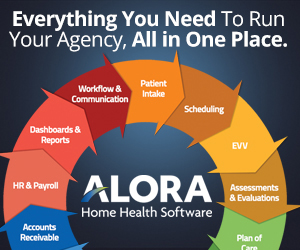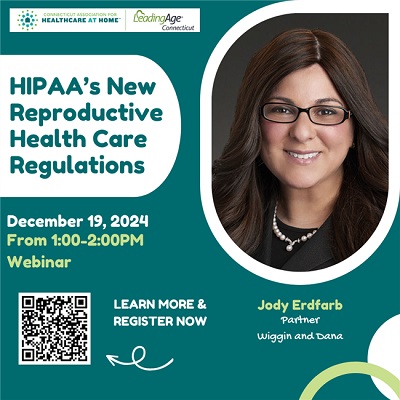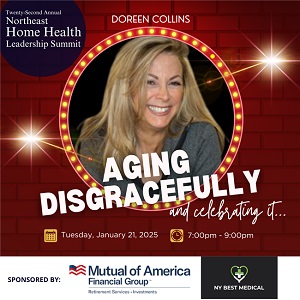 |
|||||||||||||||||||||||||
| December 12, 2024 | |||||||||||||||||||||||||
December 3, 2024
In a call with DPH last week, Pres/CEO Tracy Wodatch was informed that the drafted regulations from 2020 (Home Health) and 2022 (Hospice) will no longer move forward. The leadership and legal team at DPH have announced the need to start from scratch. Needless to say, this news comes with a level of frustration beyond words. Wodatch states, “Our provider members and consultants spent many hours drafting the revisions with DPH at the table. To say that we need to start from scratch is unacceptable.” DPH has informed the Association that a likely timeline for a new draft will be late spring. In the meantime, Wodatch is now working with membership, legal and our lobbying team to take a legislative approach by creating statutes to fix the priority problematic regulations while waiting for the updated regulations. If you have questions or language suggestions, please contact Tracy Wodatch at wodatch@cthealthcareathome.org. Source: CT News Junkie, December 9, 2024
The leadership of the House and Senate Democratic caucuses announced the creation of two new committees for the 2025 legislative session, as well as the chairs of the more than two dozen joint committees in the General Assembly. The Government Administration and Elections Committee will be split into two committees beginning next year. State Rep. Matt Blumenthal, D-Stamford, will retain the chair of the GAE committee, with a focus on election policy. State Rep. Lucy Dathan, D-Norwalk, will chair the newly formed Government Oversight committee. Source: Alliance Daily, December 9, 2024
The Office of Management and Budget (OMB) has approved the Home Health Change of Care Notice (HHCCN) for three years. There were no substantive changes made to the HHCCN form or the form instructions. CMS did make plain language and information design changes to the form and form instructions according to our Office of Communications (OC) recommendations. OC’s recommendations in plain language and information design are research-based best practices. The OC worked to apply the same research-based standards across all products and channels to make sure our language, messaging and branding are consistent. CMS has also provided the HHCCN in three additional languages with this package approval. Those languages, along with English and Spanish, include Chinese, Vietnamese and Korean. Since the current HHCCN does not expire until 12/31/2024, you may continue to use the HHCCN (OMB expiration date of 12/31/2024) until 1/31/2025; however, you will be required to use the newly approved HHCCN (OMB expiration date of 11/30/2027) on 2/1/2025. The newly OMB approved HHCCN form (expiration date of 11/30/2027) may be found in the downloads section. FFS HHCCN | CMS Source: The Alliance | Dec. 5, 2024
(Alexandria, VA and Washington, DC) – The National Alliance for Care at Home (the Alliance) is proud to announce the addition of a proven leader, Sherl Brand, RN, BSN, who will be joining the Alliance as its first Chief Operating Officer (COO), effective the middle of January 2025. Sherl Brand comes to the Alliance with a wealth of experience spanning over three decades in nursing, association management and health care management. Prior to joining the Alliance, Sherl has been serving as Senior Vice President for Hospice Care at VNS Health. Before that, Sherl held senior positions at CareCentrix and VNA Health Group. Sherl served as chair of the Forum of State Associations for almost four years, and as President and CEO of Home Care Association of New Jersey for seven years. She served on the Board of Directors of the National Association for Home Care & Hospice and the Home Care 100 Advisory Board. Source: The Alliance, December 5, 2024
On Thursday, November 21, 2024, the Centers for Medicare & Medicaid Services (CMS) released its annual Medicaid long-term services and supports (LTSS) report. This annual update is the most comprehensive national information available regarding Medicaid LTSS and home and community-based services (HCBS) enrollment, utilization and expenditures. The data includes year-over-year national trends as well as state-specific breakouts of the measures.
Source: Home Health Care News, December 4, 2024
Artificial intelligence-powered documentation does not enhance clinician efficiency but may improve their work-life balance, according to a study published in the New England Journal of Medicine.
Researchers at Atrium Health in Charlotte, North Carolina, and the Wake Forest University School of Medicine conducted a study in mid-2023 comparing 112 primary care clinicians who used Nuance’s Dragon Ambient eXperience (DAX) Copilot clinical documentation software with a control group of 103 clinicians who did not use the tool.
Source: The Alliance Daily, December 10, 2024
The findings of a Health and Human Services (HHS) Office of the Inspector General (OIG) audit revealed that Medicare improperly paid acute-care hospitals an estimated $190 million for outpatient services provided to hospice enrollees. The OIG reviewed a random sample of 100 acute-care hospital claims that were paid while a beneficiary was also enrolled in the Medicare hospice benefit. The audit was conducted from 2017 through 2021 and found that 70 of the sample claims did not comply with Medicare requirements.
In a recently released report on this audit, the OIG estimates that in addition to Medicare potentially saving $190 million during the audit timeframe if the acute-care hospital claims had complied with requirements, hospice enrollees could have saved $43.6 million in deductibles and coinsurance that may have been incorrectly collected from them or from someone on their behalf.
In this most recent audit report, the OIG stated that the hospitals were paid for outpatient services that palliated or managed hospice enrollees’ terminal illnesses and related conditions. These services were already covered as part of the hospices’ per diem payments and should have been provided directly by the hospices or under arrangements between the hospices and acute-care hospitals.
Alliance Daily | Dec. 11, 2024
The National Alliance for Care at Home has joined with a group of likeminded organizations to urge Congress to enact financial relief for family caregivers by including the bipartisan, bicameral Credit for Caring Act (S. 3702/H.R. 7165) in any tax legislation you advance in the 119th Congress. This legislation would create a new, non-refundable federal tax credit for eligible working family caregivers to help address the financial challenges of caregiving.
Family caregivers are the backbone of services and supports in this country. They help make it possible for older adults, people with disabilities, and veterans to live independently in their homes and communities. The physical, emotional, and financial challenges they face in their caregiving roles cannot be overstated. Family caregivers are of all ages, races and ethnicities and cut across all segments of our population. This is an ageless and nonpartisan issue.
Family caregivers provide about $600 billion annually in unpaid labor to their loved ones. They face out-of-pocket expenses to assist their loved ones as well as potential income and retirement savings foregone. An AARP report found that family caregivers spend, on average, 26 percent of their income on caregiving expenses or over $7,200 annually. Their assistance helps save taxpayers billions of dollars by helping to delay or prevent expensive nursing home care and unnecessary hospital stays. Family and others who provide care for veterans spend on average $11,500 of their personal income on out-of-pocket costs related to caregiving each year.
The Credit for Caring Act would create a new, non-refundable federal tax credit of up to $5,000 for eligible working family caregivers to help address the significant financial impact of caregiving. Eligible caregivers caring for loved ones of all ages could receive the credit if the care recipient meets certain functional or cognitive limitations or other requirements. This tax credit would help working family caregivers regardless of whether they live with their loved one or if their loved one is a dependent.
Family caregivers need support as they take on the costs and responsibilities associated with caregiving. Therefore, we urge Congress to enact the Credit for Caring Act.
Join us for an unforgettable evening at the Twenty-Second Annual Northeast Home Health Leadership Summit! Enjoy a night of laughter and insight with comedian Doreen Collins as she presents "Aging Disgracefully... and Celebrating It." Don’t miss this unique dinner comedy experience that promises to entertain and inspire.
The Jimmo v. Sebelius case was a landmark lawsuit that resulted in a significant clarification of Medicare coverage standards. The case challenged the unofficial “improvement standard” used by Medicare, which required beneficiaries to show medical or functional improvement to qualify for coverage of certain types of care, particularly skilled nursing care and physical, occupational, and speech therapy. This case has had profound implications for patients with chronic conditions, disabilities, or those who have plateaued in their treatment.
Key areas to explore:
|
|||||||||||||||||||||||||
| Past Issues | Subscribe | cthealthcareathome.org | Advertise with Us | |||||||||||||||||||||||||





